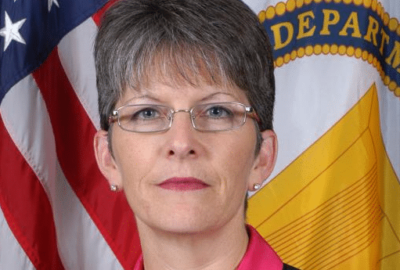
What does it take to manage agencies in a crisis?
NAPA has a long history of research into how to manage in difficult periods. Their President and CEO Terry Gerton joined us with some perspective.
Best listening experience is on Chrome, Firefox or Safari. Subscribe to Federal Drive’s daily audio interviews on Apple Podcasts or PodcastOne.
Many can manage. Fewer can steer an agency or a department through a crisis such as the nation is now facing. The National Academy of Public Administration has a long history of research into how to manage in difficult periods. Longtime federal manager and now NAPA President and CEO Terry Gerton joined Federal Drive with Tom Temin for some perspective. Read more NAPA here.
Interview transcript:
Tom Temin: Terry, Good to have you back.
Terry Gerton: Good morning, Tom.
Tom Temin: All right, So you have looked at this from all sides now, kind of like the old Carole King song. And what should managers be thinking about in general here now that we’e a couple weeks in?
Terry Gerton: I think the important thing is there’s no secret sauce. The practices that are good leadership practices in times that are not crisis are equally important in times of crisis. You know, things like getting in front of your people and talking to them on a regular basis so that they know what the organization is focused on and what you was a leader are doing to take care of them and take care of the mission. Having a strategic plan and performance metrics that you can hold to making sure that you’re talking to your stakeholders to let them know what’s going on with your organization and planning ahead and talking about it all the time. Those are important when it’s not crisis and super important when it is.
Tom Temin: Because of these times, you know, a million consultants crawl out of the woodwork and PR companies specializing in crisis communications and all of this, and it seems more like if you are good at the solid basics of management when a crisis hits, it’s just a couple of steps up from what you were doing rather than starting all over. Now what do I do?
Terry Gerton: Well, that makes it sound easy. But I think what we know from practices that actually good leadership is hard and it takes two critical components. It takes time, and it takes courage. And courage is especially important in crisis times, cause sometimes you have to tell people things that are uncomfortable or unpleasant. But it takes time for leaders to really understand their organization and to build the trust with their employees in their stakeholders and then, especially in times of crisis, it takes courage to be out in front and say the things that need to be said. But that’s the important element really being clear in your communications and telling people that transparent truth.
Tom Temin: And I guess there’s a point in a federal managers development or in the development of a crisis like this, when you have to go a little bit on instinct and worry about whether you are following every codicil and subparagraph, parentheses I parentheses, etc., regulation. I mean, you have to follow the rules and regs, but at some point don’t you have to kind of show a little bit of, I don’t know the polite word, guts, and just go ahead and do what you think you need to do.
Terry Gerton: Well, I think that’s true. And if you’ve invested the time before the crisis to have those plans in place. To have built the trust account so that when you get out front and you have to take some risks, because, frankly, you’re seeing situations now that you know you really haven’t encountered before. But if you’ve done the planning and you’ve done the leadership work and your employees trust you and your stakeholders trust you, then when you have to be in a time where there’s some risk in decision making, you’ll have built that trust account and your people and your constituents will trust you to take the steps that are in their best interest and in the best interest of the organization.
Tom Temin: And part of the difficulty of leadership is having that risk management planning done. And one of those elements, I guess we now know, should be a risk, such as can nobody get to the office on the same day?
Terry Gerton: Right, Right. You know, we’ve been talking about the importance of telework for a long time as a continuity of operations strategy and whether you planned for it and executed it in the past as a pilot, or whether you did test work from home days, or whether you had a routine workforce that worked from home. Now you’re getting the chance to practice it in real time. So we’re finding agencies for whom that was sort of normal practice have adapted, and the operations are continuing fairly smoothly. For organizations where it wasn’t an organizational cultural practice, that process has been much more difficult.
Tom Temin: And NAPA has a small library of case studies in how to be prepared and agencies that simply can’t stop working and so forth. Tell us about a couple of those.
Terry Gerton: Well, I would refer your listeners to our website at napawash.org under studies you can find all of these public documents. But I think as an example of an institution that’s really been in crisis for a while, thinking about the National Nuclear Security Enterprise. That’s a place where we don’t want to have crisis. And it’s probably a place that not everybody thinks about every day. But the academy has been working for several years at congressional direction with the National Nuclear Security Administration. They had years of studies and hundreds of recommendations on process improvements that they needed to make to really ensure that our nuclear laboratories and our nuclear enterprise was working smoothly and just weren’t able to make any progress. And so we’ve been working with them and the National Academies of Science for 4.5 years now to help put in place the right kinds of processes and planning on the right kinds of communication, the right kinds of personnel management practices to really get them to a point where the enterprise is working smoothly. But I will give quite a bit of credit to the administrator there, Lisa Gordon Hagerty, who’s been on board since February of 2018, who’s really taken these recommendations onboard and you can see in their 2019 strategic vision document that they’ve really begun to implement the right kinds of management practices that position them for the future and remedy a number of the sort of organizational challenges that we were just talking about.
Tom Temin: As a matter of fact, Mrs. Gordon Hagerty has been on the show in a two-part interview, and she did seem to definitely be on top of things. And I guess there’s the question of whether an outsider has to come in and take on this type of challenge, this kind of shortfall. Or can it also originate with someone who’s been there a long time?
Terry Gerton: I think either is true, but critical to the success of any leader in this kind of position where you’re charged with remedying a long history of challenges is you’ve got to have the time. You can’t be somebody that’s there for 18 months. You’ve gotta come in with a long term perspective. Organizational and cultural change takes on average and depending on whose article you read, 5 to 8 years. And so when you think about political appointees who come in with the 18 to 24 month time frame, it’s really difficult to have the longevity of both 10 year and perspective that’s so necessary to drive this kind of organizational cultural change.
Tom Temin: So times like these then are really a stress test of the political hyphen career SCS type of relationship. And if that’s solid, you’ll probably be a lot better off than if there’s tension beforehand.
Terry Gerton: Absolutely, you need the mix of the deep technical expertise and the deep organizational knowledge that comes from your career executives and your career workforce. And then you need the out front perspective from the political appointees. And if you’ve got as you say, a good relationship between those two communities, then it’s going to be much easier. Maybe not easy, but easier for the organization to respond in times of crisis.
Tom Temin: Terry Gerton is president and CEO of the National Academy of Public Administration. Thanks so much for joining me,
Terry Gerton: Tom, thanks so much and be well.
Copyright © 2025 Federal News Network. All rights reserved. This website is not intended for users located within the European Economic Area.
Tom Temin is host of the Federal Drive and has been providing insight on federal technology and management issues for more than 30 years.
Follow @tteminWFED
Related Stories




